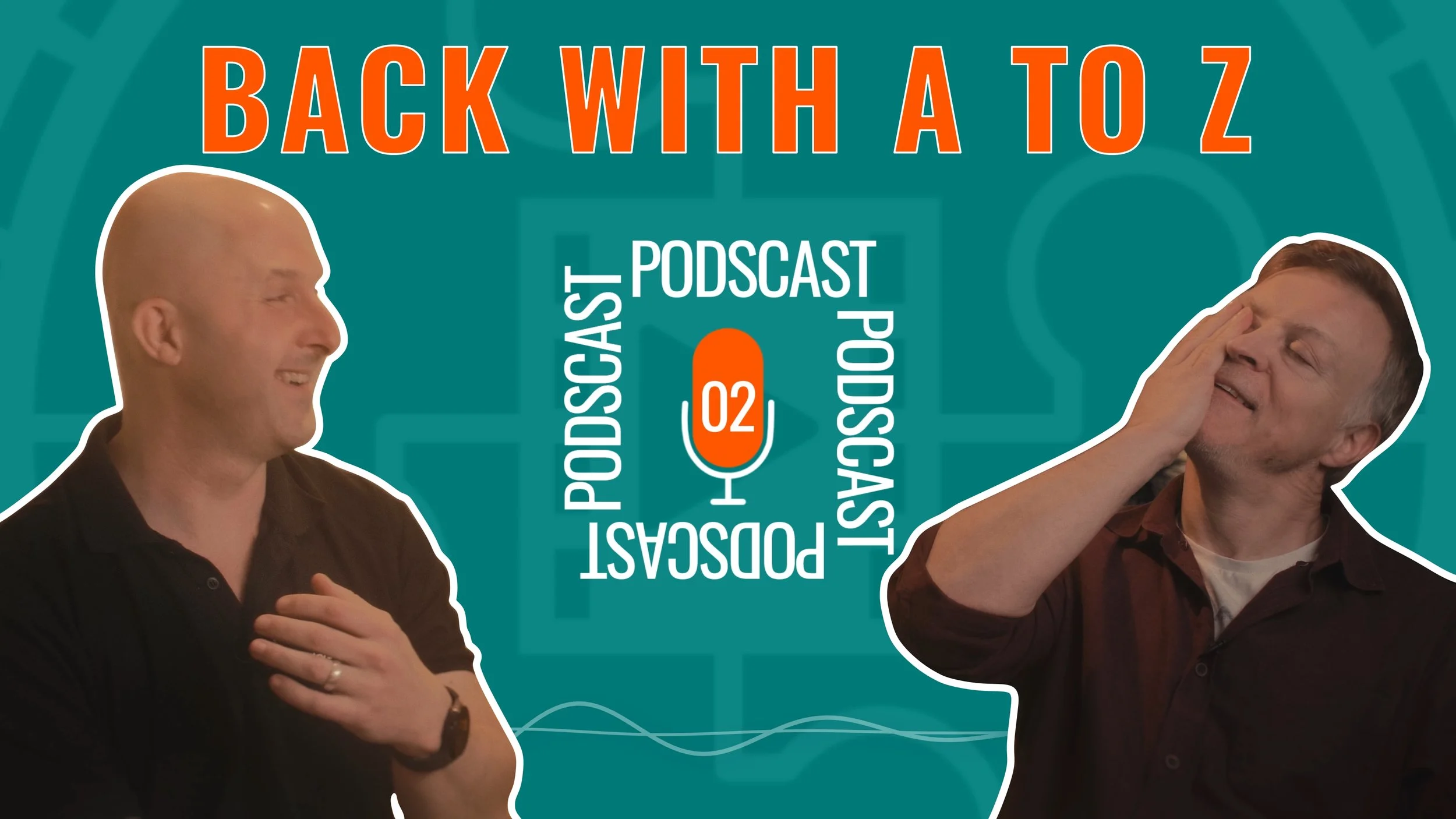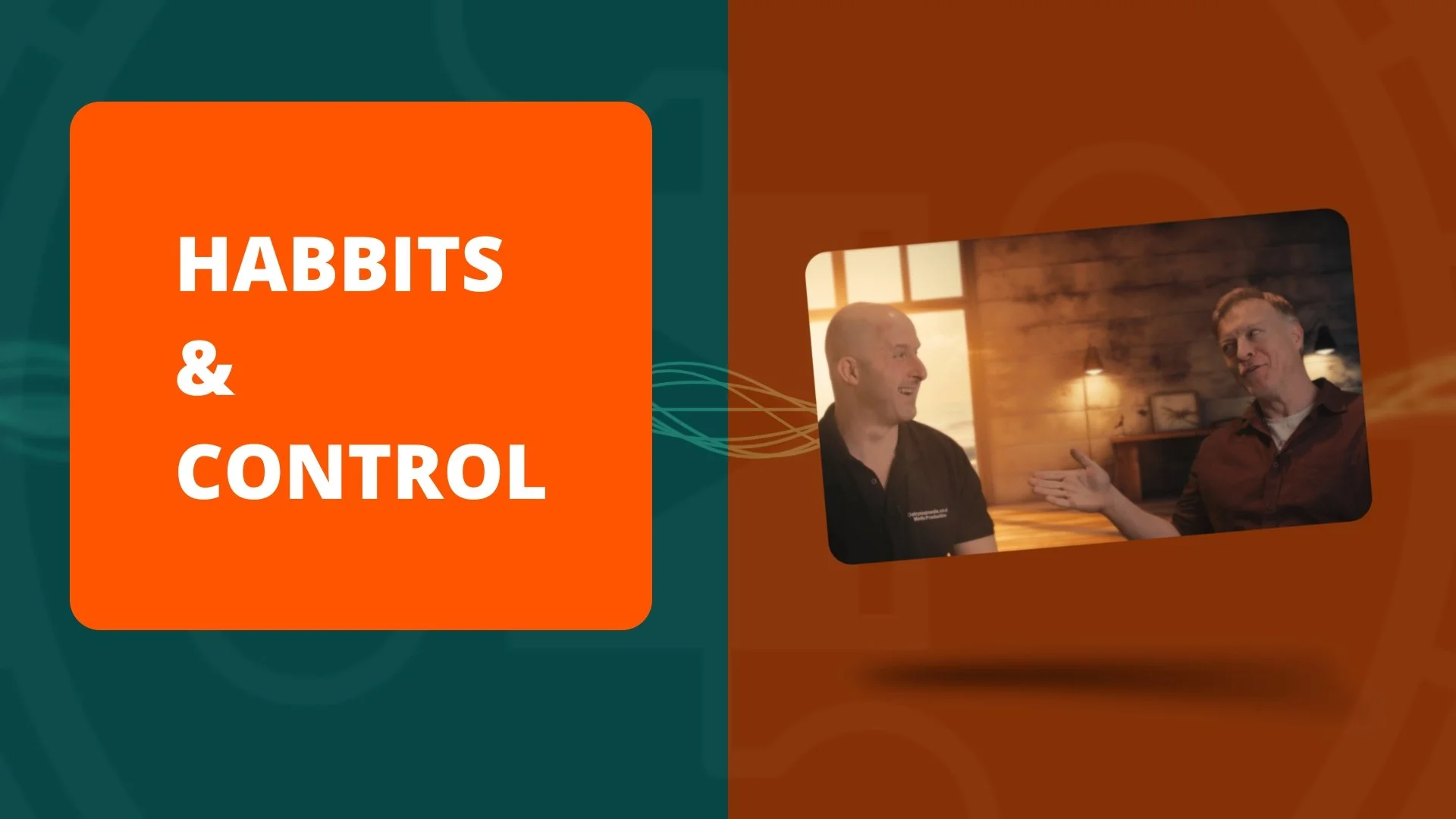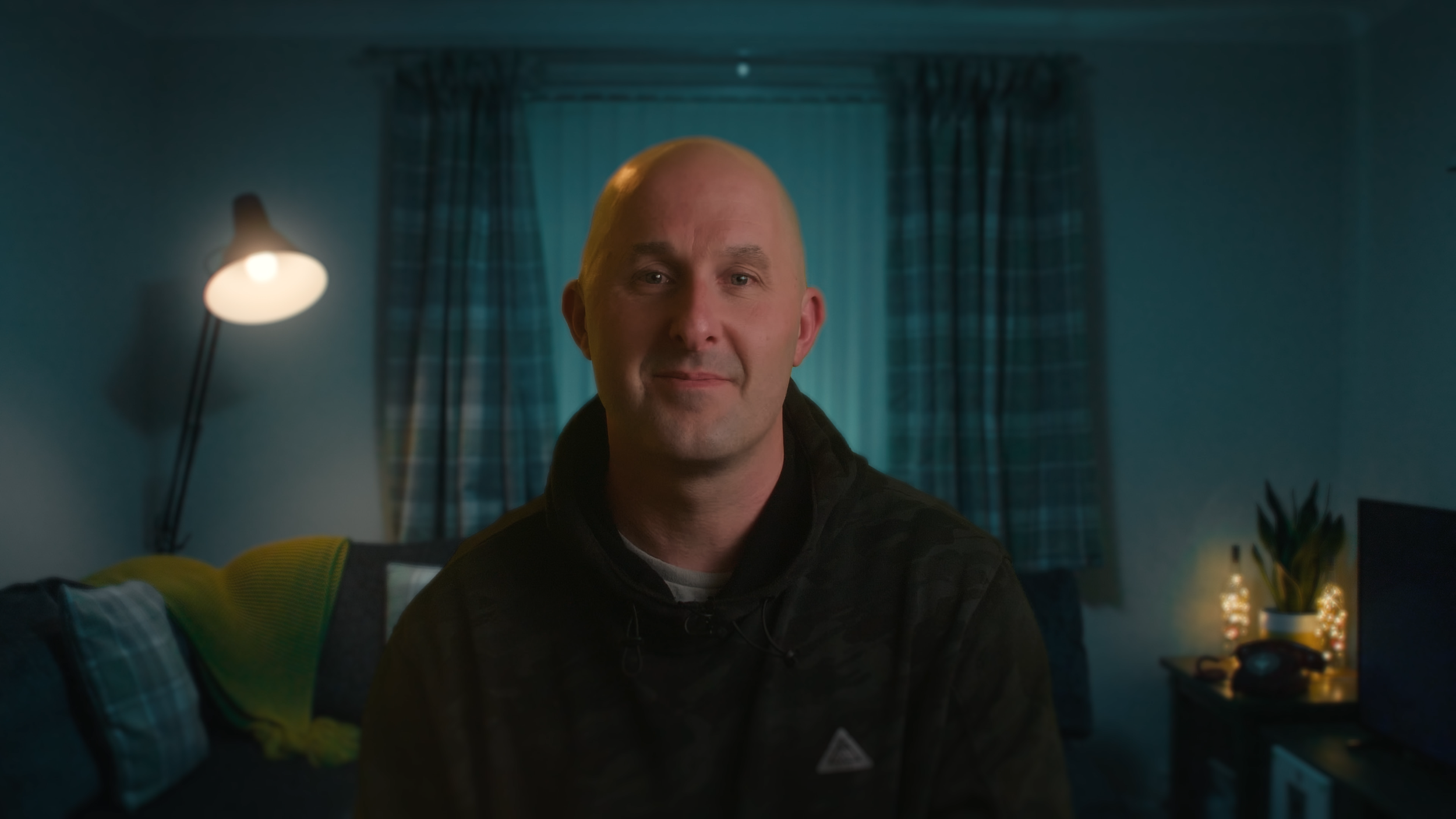Welcome to the Datrysiad Media / A to Z Podcast, where we unravel the magic of Acceptance and Commitment Therapy (ACT), recording content for your business and other insightful topics.
In today's episode, we plunge into the universal theme of control, exploring its nuances with an open and relatable vibe.
We kick off the conversation by acknowledging life's inherent uncertainties and the anxiety they often bring. Drawing on real-life scenarios, they illuminate the pitfalls of overthinking and the futile pursuit of resolving every issue. The dialogue gracefully pivots to the delicate dance between self-reflection and unproductive rumination, emphasizing the uniqueness of each relationship.
We candidly share personal experiences, the narrative gracefully weaves through the labyrinth of control, acceptance, and personal growth. Without directly referencing the transcript, this episode emerges as a captivating exploration of life's complexities, offering practical insights rooted in ACT principles.
Whether you're a seasoned advocate of therapy or a newcomer to the world of self-discovery, the ACT Podcast invites you to join this journey towards a more purposeful and empowered existence.
WATCH THE FULL EPISODE OR EXPLORE EACH SECTION BELOW
Unlocking Corporate Well-being: Navigating Engagement in Psychological Flexibility Training
The focus shifted to the reception of psychological flexibility training within businesses. Dan, emphasizing the importance of demonstrating tangible returns on investment, discussed his approach of group training for 30 to 50 individuals, aiming to make these valuable skills accessible to a broader audience.
Acknowledging varying levels of engagement, Dan strategically identifies cohorts within a company to maximize enthusiasm during training sessions. He highlighted the 80-20 rule, noting that approximately 40% of a business is generally receptive to mental health and well-being initiatives, with 20% showing eagerness, 20% avoiding engagement, and the remaining 60% open but requiring more information.
Dan’s pragmatic perspective underscores the challenges and opportunities in fostering corporate well-being, emphasizing the potential impact of training on individual and collective success.
Navigating Presentation Challenges: Overcoming Engagement Hurdles in Well-being Discussions
In the realm of delivering presentations, Dan shared insights into the mental aspects faced by presenters dealing with varying levels of audience engagement. Addressing disinterest, he remains unfazed, recognizing the adage that, while you can lead a horse to water, you can't make it drink. Dan strategically targets receptive groups, acknowledging the critical role of enthusiasm in the success of psychological flexibility training.
He highlights the occasional surprise when initially disinterested individuals later express gratitude for the valuable insights gained. In tackling presenter anxiety, Dan advocates showcasing personal transformation as the most powerful tool, urging presenters to exemplify the positive impact of psychological flexibility in their own lives.
Ultimately, he stresses the potency of tangible change in influencing skeptical audiences, making a compelling case for the efficacy of well-being practices.
From Stress to Success: The Evolution of Video Creation
Stepping back into the video-making journey, Dan shared insights into his experience, comparing the initial attempt to the latest recording. Recalling the challenges of finding the right cadence and setup during the first video, Dan acknowledged the stress and effort invested in refining the message.
In contrast, the recent video presented a smoother process, with a ready script and a successful one-take recording. We commended Dan's seamless delivery and stressed the importance of having a template and structure for content creation. The conversation delved into the role of passion and overcoming initial hurdles, highlighting the delicate balance between discomfort and the rewarding outcomes of crafting compelling content.
Dan expressed gratitude for the supportive environment provided by Datrysiad Media, who emphasized the significance of managing anxiety to facilitate creativity and a seamless process.
The discussion unfolded a transformation from initial stress to a more confident and efficient video creation process for Dan.
Mastering the Teleprompter: Streamlining Communication and Enhancing Delivery
Delving into the nuances of teleprompter usage, the conversation between Dan and myself explores the evolving perceptions and benefits of integrating this tool into their video creation process. Acknowledging the initial hesitations, Dan attested to the teleprompter's transformative impact, making his messages more concise and the delivery process significantly smoother.
While initially averse to this tool, Dan quickly adapted, recognizing that practice enhances proficiency. The dialogue revealed the potential pitfall of over-focusing on the script at the expense of natural gestures and emotions. However, as both hosts became comfortable with the teleprompter, we discovered a natural fusion of scripted content with genuine expressions.
Dan shared his own journey of embracing the teleprompter to streamline content creation, emphasizing the importance of aligning scripted elements with personal delivery styles. The discussion highlighted the teleprompter as a valuable asset in facilitating a more controlled and effective communication process, ultimately enhancing the overall quality of their video content.
Unraveling the Control Conundrum: A Dive into ACT
We delve into the intricacies of Dan’s latest video on control, humorously acknowledging the occasional forgetfulness on my part.
The conversation unfolds as Dan shares insights into the challenges of acting on intrusive thoughts and how Acceptance and Commitment Therapy (ACT) addresses these cognitive struggles.
Dan reflects on the importance of taking action aligned with real threats versus perceived ones, illustrating with examples like the common concern of forgetting to lock the front door. We emphasize the tendency of the human brain to amplify possible threats, leading to a cycle of control-seeking behaviors that may limit one's life.
With a touch of humor, We discuss the metaphorical "monkey on the shoulder" and how ACT helps individuals peacefully coexist with uncomfortable thoughts. We unveil the paradoxical result where, by not engaging too much with these thoughts, the metaphorical monkey becomes quieter, paving the way for a virtuous circle of well-being. I add a lighthearted touch to the conversation, imagining the monkey's noisy demands as just another mouth to feed in a household already bustling with animals and kids.
Navigating the Choice Point: Overcoming OCD Tendencies with Psychological Flexibility
Dan and myself explore the nuances of intrusive thoughts and the challenge of resisting compulsive behaviors, using my personal experience with door-locking anxiety as an example. I candidly describes the ritual of double-checking the front door, even when reassured by his wife, showcasing the commonality of such behaviors. Dan introduces the concept of the "choice point" in ACT, where individuals face a decision between the well-worn path of giving in to compulsions or the more challenging road of enduring discomfort.
We discuss the transformative power of choosing the high road, allowing discomfort to dissipate naturally over time. I share instances where, despite initial anxiety, committing to the decision brought relief, emphasizing the importance of overcoming these challenges to build psychological flexibility.
The conversation unfolds to highlight the ongoing nature of this process, akin to fueling a car with psychological resilience. Ultimately, the discussion delves into the paradoxical idea that relinquishing control over certain behaviors can lead to a greater sense of control in one's life. I contemplate using chocolate as an extrinsic reward to reinforce positive choices, adding a lighthearted touch to the exploration of psychological principles.
Unraveling the Distinction Between Pain and Suffering: A Dive into ACT Philosophy
In this engaging conversation between Dan and myself, we explore a crucial aspect of Acceptance and Commitment Therapy (ACT) – the distinction between pain and suffering. Dan skillfully breaks down these concepts, shedding light on how individuals often amplify their emotional pain through thought patterns and avoidance behaviors.
We begin with an acknowledgment of life's inevitable pain – be it physical or emotional. Dan focuses on emotional pain, encompassing challenges like relationship issues, financial struggles, or job-related threats. The conversation pivots around the human tendency, fueled by a negativity bias, to amplify negative outcomes through abstract thought. This, in turn, leads to spirals of overthinking and avoidance behaviors that exacerbate suffering.
Dan introduces the concept of the "choice point" in ACT, where individuals decide whether to take actions in service of what's important to them or succumb to avoidant strategies. The discussion delves into the pitfalls of avoiding discomfort and the potential for long-term consequences. An illustrative example includes individuals ruminating on past relationships, attempting to resolve issues that may not be relevant in future dynamics.
A thoughtful exploration unfolds regarding the limitations of personal control, especially in global issues like the climate crisis. Dan emphasizes the importance of taking action within one's sphere of influence while acknowledging the boundaries of individual impact.
The conversation steers toward self-reflection and learning from past experiences. Dan addresses the delicate balance between healthy self-reflection and unhelpful rumination, cautioning against getting trapped in a cycle of overanalyzing past actions. The conversation concludes with considerations of personal responsibility, recognition of the need for change, and the pragmatic approach of ACT in providing skills for a more fulfilling life.
Unveiling the Pursuit of Control as a Coping Mechanism
Dan and I explore personal experiences related to the theme of control as a problem, shedding light on how individuals often resort to certain behaviors to mitigate pain. We discuss the diverse ways people seek control and the potential pitfalls associated with such coping mechanisms.
Beginning with a personal reflection from Dan, sharing a moment from his past where he found himself questioning whether an ambulance he encountered was related to an accident he might have caused while on autopilot. This compelling anecdote highlights the irrationality that can accompany the quest for control, leading Dan to retrace his journey to gain a sense of certainty – a vivid manifestation of the need to control an aspect of life for a perceived sense of safety.
The conversation broadens to address how others might manifest similar tendencies. Dan underscores the prevalence of extraneous substances, such as alcohol and drugs, as tools to take the edge off stress and regain a semblance of control. We delve into the nuanced discussion of what constitutes workable and unworkable behaviors, emphasizing the importance of balance in coping mechanisms.
We explore avoidance and distraction as common strategies employed by individuals grappling with the desire for control. Examples include binge-watching television or engaging in online content consumption, with a humorous nod to YouTube (and the hope that people are indeed watching).
The conversation provides valuable insights into the multifaceted ways individuals grapple with the need for control to manage life's challenges. It prompts contemplation on the fine line between adaptive and maladaptive coping mechanisms, encouraging a nuanced understanding of how individuals seek to navigate and exert control in the face of discomfort.
Navigating the Perils of Reassurance-Seeking in Relationships
Dan and I explore the intricate dynamics of seeking reassurance in relationships, shedding light on the potential pitfalls and challenges it introduces. We begin by acknowledging the common inclination to seek reassurance, particularly when uncertainties or concerns about the relationship arise. The dialogue unfolds as we dissect the nuanced repercussions of this behavior, highlighting its potential impact on power dynamics and the mental well-being of both individuals involved.
Raising the issue of seeking reassurance in relationships, framing it as a common response when uncertainties about the relationship's status surface. We dissect the intricacies of this behavior, emphasizing its potential consequences, such as being perceived as needy or creating an imbalance in the power dynamic within the relationship.
The conversation delves into the challenges faced by both parties involved. We explore the potential mental fatigue experienced by the reassurance-seeker and the recipient's struggle to manage the demands of a partner constantly in need of validation. The dialogue recognizes the genuine reasons behind such behavior, acknowledging past traumas or negative relationship experiences that may drive individuals to seek reassurance.
As we navigate through the complexities of reassurance-seeking, we touch upon the shift in relationships from the exhilarating "honeymoon phase" to the more pragmatic and transactional stage. This transition, often marked by a decrease in the initial intensity, can trigger insecurities and prompt individuals to question the stability of the relationship.
A critical point of reflection emerges as we collectively question the healthiness of incessant reassurance-seeking in relationships. The conversation underscores the importance of fostering open communication and addressing concerns directly, rather than relying on constant validation.
Harnessing Control for Productivity and Self-Reflection
Dan and I explore the multifaceted nature of control, challenging the notion that it is inherently negative. Drawing from personal experiences, we unravel scenarios where control serves as a constructive force, guiding individuals to take helpful actions. The conversation unfolds with insights into recognizing the dichotomy of thoughts—some prompting constructive actions, while others, unhelpful, may lead to procrastination or unnecessary worry.
Dan initiates the conversation by emphasizing that control, though often associated with negativity, can be wielded in positive ways. He shares a personal anecdote about a rush of panic triggered by the thought of forgetting to pick up his son from nursery. This instance highlights the helpful nature of control, prompting him to take swift action, even though, upon reflection, it proved unnecessary. The narrative navigates through various examples, such as managing work tasks and addressing urgent matters, where control can be harnessed positively.
The concept of helpful and unhelpful thoughts, illustrating that individuals face a constant stream of both types daily. I share instances where identifying helpful thoughts spurred me into action. Simultaneously, he acknowledges the challenges posed by unhelpful thoughts, using the metaphor of the recurring concern about locking the front door when leaving the house.
As the conversation progresses, we explore the dynamics of procrastination and decision-making. I describes instances where he consciously chose less burdensome tasks over more critical ones, leading to a realization of impending consequences. This revelation prompts a discussion on the importance of self-awareness and recognizing patterns of procrastination.
Dan introduces a practical tool, the Act Matrix, as a means to cultivate awareness and prompt action. This tool involves creating a visual representation of one's priorities, actions aligned with values, and obstacles hindering progress. By physically writing down these elements, individuals can enhance their awareness and motivation to tackle procrastination.
Navigating Healthy Habits and Recognizing Control
Dan and I engage in a thoughtful discussion about the fine line between cultivating healthy habits and potentially falling into the trap of excessive control. Using the example of increasing gym visits, we explore how seemingly positive behaviors can transition into unworkable patterns, adversely affecting one's well-being and daily functioning.
The conversation begins with myself highlighting the commonality of individuals engaging in activities like going to the gym to improve their well-being. However, we dissect the potential shift from a healthy habit to a controlling behavior. The dialogue emphasizes the importance of recognizing when a behavior becomes unworkable, considering its impact on various aspects of life.
Dan acknowledges the challenge of pinpointing the exact moment when a behavior crosses the line, emphasizing the subjective nature of such evaluations. Dan introduces the concept of workability, suggesting that behaviors need to be assessed based on their impact on one's ability to function effectively in different aspects of life.
The narrative explores a hypothetical scenario where excessive gym sessions lead to exhaustion, affecting an individual's performance at work. Dan argues that, in this case, the behavior becomes unworkable, especially if the individual is not a competitive athlete with specific training requirements. This prompts a series of questions about the workability of behaviors and the need to strike a balance between personal satisfaction and the potential pitfalls of excessive control.
ABOUT ME
My name is Byron Phillips and I run Datrysiad Media.
Datrysiad Media is a video production company based in Cardiff. We help businesses with their pain problems and communicate their stories.
We are a full-service video production that can handle every aspect of the video production process. Creating high-quality video content that meets your needs and exceeds your expectations.








